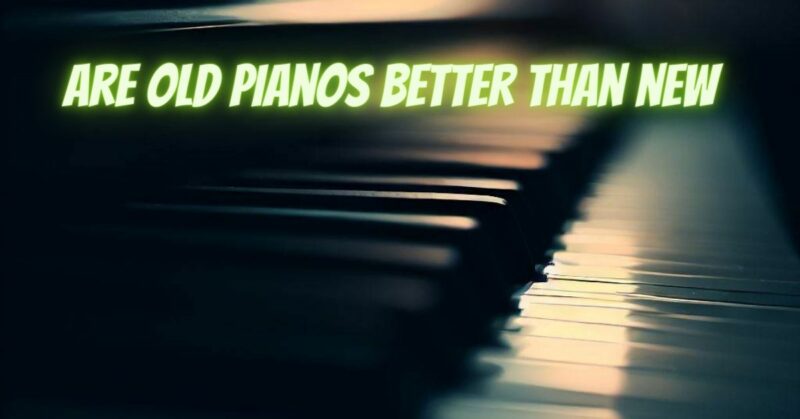Pianos have been captivating music enthusiasts for centuries, and they come in various shapes, sizes, and ages. While newer pianos offer modern features and manufacturing techniques, older pianos hold a unique charm and appeal to many musicians and collectors. In this article, we will explore the advantages of older pianos compared to their newer counterparts, shedding light on the distinctive qualities that make vintage instruments a prized possession for many.
- Timeless Craftsmanship
Older pianos, especially those crafted in the 19th and early 20th centuries, often boast intricate craftsmanship and attention to detail that have stood the test of time. Skilled artisans meticulously built these instruments with traditional methods and materials, resulting in a level of craftsmanship that can be challenging to replicate in newer mass-produced pianos.
- Unique Tonal Character
One of the most significant advantages of older pianos is their distinctive and matured tonal character. Over time, the soundboard, strings, and wooden components of the piano age and season, giving vintage instruments a warm and rich tone that many musicians find captivating. This unique tonal quality is often considered more nuanced and full-bodied compared to newer pianos.
- Well-Aged Wood
The wood used in older pianos has had decades or even centuries to season and mature, resulting in a more stable and resonant instrument. This well-aged wood contributes to the piano’s overall tone and sustain, enhancing the instrument’s performance.
- Collectible Value
For piano enthusiasts and collectors, vintage pianos hold significant collectible value. Pianos from reputable manufacturers and famous makers of the past are often sought after as prized possessions and can appreciate in value over time.
- Sustainable Choice
Opting for an older piano contributes to sustainability and environmental consciousness. By preserving and restoring vintage instruments, musicians and piano enthusiasts can reduce the demand for new pianos, which require the use of natural resources during production.
- Affordability
In many cases, older pianos can be more affordable than their newer counterparts, especially if they require some restoration or maintenance. This affordability allows aspiring musicians or individuals on a budget to access high-quality instruments without breaking the bank.
- Nostalgic Connection
Owning and playing an older piano can create a nostalgic connection to the past. Vintage instruments have often been passed down through generations, and playing on a piano with a rich history can evoke emotions and memories from the past.
- Inspiration and Creativity
For many musicians, playing an older piano can be a source of inspiration and creativity. The unique tonal characteristics and character of vintage instruments can lead to new musical ideas and artistic expression.
While newer pianos offer advanced features and modern manufacturing techniques, older pianos hold a distinct appeal for musicians and collectors alike. The timeless craftsmanship, unique tonal character, and well-aged wood of vintage instruments contribute to their enduring charm. Owning an older piano not only connects us to the past but also allows us to appreciate the artistry and craftsmanship of generations of piano makers. Whether you seek a collectible treasure, an affordable option, or a source of creative inspiration, older pianos offer advantages that make them a cherished choice for many musicians and music enthusiasts.


